By Thomas Ultican 10/29/2018
Diane Ravitch opened the fifth Network for Public Education (NPE) conference stating, “We are the resistance and we are winning!” She noted that “reformers” were envious of our domination of social media. When they hired mercenaries to staff their own multimillion dollar web-publications to counter us; they failed. We still dominate social media.
Ravitch listed a long string of victories including:
Leonie Haimson and her Class Sizes Matters organization successfully fought Bill Gates’ $100,000,000 Inbloom data base project that would have abrogated the privacy rights of countless children and their parents.
Jitu Brown led a thirty-two day hunger strike that saved the Walter Dyett high school, the only open enrollment high school in the Bronzeville community of Chicago.
Charter school growth has slowed significantly. Without the literally billions of dollars from “fauxlanthropists” and the federal government these often corrupt private businesses would have gone the way of the Edsel.
Diane concluded, “We’re winning. David is beating Goliath.”
Ravitch then introduced the famed Finish educator, Pasi Sahlberg, who coined the apt acronym for the worldwide school privatization phenomena by calling it the Global Education Reform Movement (GERM). Sahlberg began with stressing that what happens in the United States is extremely important because what we do here affects the rest of the world. He said, “You are making progress. The global situation is getting better.”
Pasi Sahlberg has served at the World Bank in Washington, DC , the European Commission in Italy and acted as an external expert to the Organization for Economic Cooperation and Development (OECD) advising governments in more than 50 countries. He is a former Director General at Finland’s Ministry of Education and a Visiting professor of Practice at Harvard Graduate School of Education. He also chairs the Open Society Foundation’s Education Board and is a member of the Governing board of the University of Oulu, the Centre on International Education Benchmarking and the International Council of Education Advisors (ICEA) for the Scottish Government . He is currently working in Australia as a Professor of Education Policy at the University of New South Wales in Sidney.

Pasi’s Slide Demarking Bad Education Policy and Good Education Policy
Professor Sahlberg’s presentation dealt with the negative effects being observed throughout the planet due to implementation of “GERM” policies. He shared several data sets including one implicating “GERM” initiatives in the degradation of student mental health. The following slide shows a correlation between screen time pushed by captains of technology industries such as Mark Zuckerberg and student mental health.
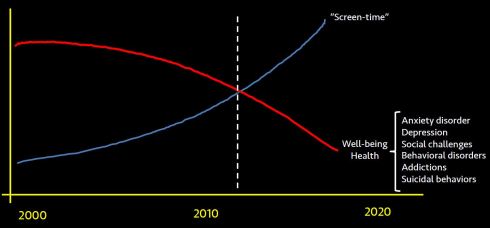
Slide Shows Correlation Between Screen-time and Mental Health
He also shared some surprising conclusions from education researchers at the World Band and the (OECD).
“School choice advocates often argue that the introduction of market mechanisms in education allows equal access to high quality schooling for all…However evidence does not support these perceptions, as choice and associated market mechanisms can enhance segregation.” –OECD, 2012
“There is no consistent evidence that private schools deliver better learning outcomes than public schools. Numerous risks, such as the exclusion of disadvantaged or less able or desirable students, social segregation, exploitation of families for profit and the undermining of public education [exist].” –World Bank, 2017
Pasi ended his presentation on a similar note to Diane’s. He listed off places around the world where “GERM” is being reversed:
Sweden is in the process of reversing the unexpectedly sad results of their 1990’s decision to embrace school privatization.
Chile (the first victim of “GERM”) is “abolishing school selection, banning for-profit schools and investing in the teaching profession.”
Scotland is embracing a whole-child curriculum that focuses on equity and strengthening the role of play in the lower grades.
Liberia is now resisting privatization by for-profit foreign operators and the de-professionalizing of education.
Australia is reviewing the value of NAPLAN their standardized testing program. They are focusing on equity, well-being and early childhood education.
Singapore is mandating less testing, less student rankings, and more whole-child education.
New Zealand is removing national education standards, adopting less testing, abolishing charter schools, and encouraging more teacher and student voices. The new government won office by campaigning on a public education platform opposed to standards, testing and privatization.
Professor Sahlberg concluded by saying, “The problem is not completely solved but we are moving in the right direction.”
SOS Arizona the First Recipients of the Phyllis Bush Award
This year, NPE established a new award for community activism and named it after founding board member Phyllis Bush. The new to be annual award went to Save Our Schools Arizona. Two passionate women from Arizona, Beth Lewis and Sharon Kirsch received the award for SOS Arizona which stopped David and Charles Koch’s plan to massively expand vouchers in Arizona.

Sharon Kirsch and Beth Lewis Receive the Phyllis Bush Award for SOS Arizona from Phyllis Bush – Photo by Anthony Cody
After being ignored by state legislators who passed the Koch brother’s voucher law, they were demoralized. When Governor Doug Ducey dutifully signed the law, Beth and SOS Arizona decided to fight. They ignored all advice and precedence by staging an unlikely referendum signature drive. SOS Arizona surprised the professionals by running a successful campaign forcing the voucher law to the ballot which under Arizona law put it on hold.
Immediately, the Koch brothers set up a legal challenge and the SOS Arizona team had to fund raise to hire legal representation. After fighting and winning all the way to the state supreme court, SOS Arizona prevailed and the fate of the voucher law will be decided by the state’s voters on November 6.
Machine Learning and Data Mining Two Trojan Horses from the Technology Industry
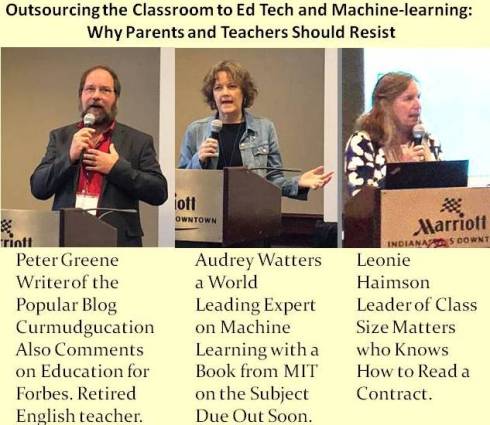
This Expert Panel Delivered a Powerful Message on Tech Inspired Student Harm
Leonie Haimson, who has a long successful history of working to protect student privacy, said a key understanding is that nothing is free. When a technology company provides software, computers, tablets or any other tech product for free, they expect something back – data. And even if you trust company “Z” to respect your privacy, it is likely that the data collected at schools will be stolen if not sold.
Audrey Watters apprised about the history of education technology, teaching machines and the failure of tech companies to come anywhere close to meeting their predictions. She shared, “Thomas Edison famously predicted in 1922, for example, ‘I believe that the motion picture is destined to revolutionize our educational system and that in a few years it will supplant largely, if not entirely, the use of textbooks.”’
Audrey defined artificial intelligence (AI) as little more than predictive algorithms based on statistics. She gave two reasons parent and teachers should resist “personalized learning” and the oversold AI. First, the software is proprietary which means we only see the inputs and outputs but not the decision making process. Second she asserted,
“Algorithms are biased, in part, because they’re built with data that’s biased, data taken from existing institutions and practices that are biased. They’re built by people who are biased. (Bless your hearts, white men, who think you are the rational objective ones and the rest of us just play ‘identity politics.’)”
Peter Greene reinforced Audrey’s claims about AI being yet one more over-hyped product from the technology industry which comes with peril for students. He said it is as if somebody walked into your classroom and said these three students belong in the advanced class and those three should be moved to the remedial class but will not tell you how they know. You would not listen to them and you certainly should not be run by a black box with a secret algorithm.
Little Sis the Antidote for Big Brother
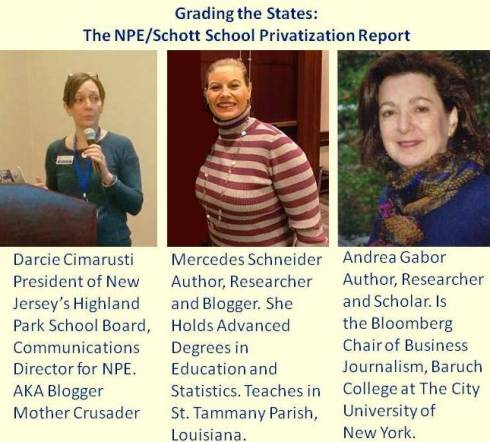
NPE in cooperation with the Schott Foundation recently published Grading the States. The breakout session on that topic became more of an advanced seminar in researching tax documents and coalitions of groups working to privatize public education.
Schneider described how non-profit organization must file tax forms that detail their giving called a form 990. Mercedes also explained that there is also a form 990 PF and if that is the form filed, the filer must also list contributions to the private foundation. Gates and Walton file form 990 PF.
Gabor explained how to find these forms. She said she prefers the Foundation Center for her personal searches. Andrea noted that finding some foundations can be difficult and that it is often better to use less information in a search when the common foundation name yields no results.
Andrea Gabor’s latest book is called After the Education Wars: How Smart Schools Upend the Business of Reform.
Darcie Cimarusti did a lot of the research for the new report, Hijacked by Billionaires: How the Super Rich Buy Elections to Undermine Public Schools. She shared her use of LittleSis in doing that research. It is a free database detailing the connections between powerful people and organizations. Who do the wealthiest Americans donate their money to? Where did White House officials work before they were appointed? Which lobbyists are married to politicians, and who do they lobby for?
One form of data presentation from LittleSis is mapped connections. The screen grab below is of a map created by Darcie showing the moneyed connection around the 2017 LA school board election. On LittleSis, all of the shown paths are rollovers or links to data. For example, the link from Reed Hastings to the California Charter Schools Association (CCSA) reveals $8,520,500 going to their independent expenditures committee.
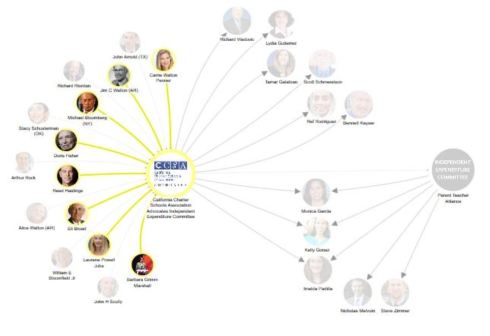
Darcie’s Map of Billionaire Donations to the CCSA Independent Expenditure Committee
NPE’s Diverse Environment is Manifesting Youthful Leaders
Jitu Brown is National Director of the Journey for Justice (J4J), an alliance of grassroots groups fighting against privatization and for sustainable community schools in over 28 cities including Atlanta, Baltimore, Birmingham, Boston, Chicago, Dayton, Denver, Detroit, Eupora and Kilmichael Mississippi, Los Angeles, Newark, Patterson, Camden, Jersey City, Milwaukee, Minneapolis, New Orleans, New York City, Brooklyn, Oakland, Philadelphia, Pittsburgh, Wichita and Johannesburg, South Africa!
This year Jitu and J4J came with a message:
“We are not fooled by the ‘illusion of school choice.’ The policies of the last twenty years, driven more by private interests than by concern for our children’s education, are devastating our neighborhoods and our democratic rights. Only by organizing locally and coming together nationally will we build the power we need to change local, state, and federal policy and win back our public schools.”
J4J introduced their #WeChoose campaign which has seven pillars:
- A moratorium on school privatization.
- The creation of 10,000 community schools.
- End zero tolerance policies in public schools now. (Supports restorative justice)
- Conduct a national equity assessment.
- Stop the attack on black teachers. (In 9 major cities impacted by school privatization there has been a rapid decline in the number of black teachers.)
- End state takeovers, appointed school boards and mayoral control.
- Eliminate the over-reliance on standardized tests in public schools.
For a real treat check out this video of Jitu Brown leading the NPE conference in a chant he learned from a high school student in Chicago.
Jitu Brown introduced Sunday morning’s keynote speaker, Jesse Hagopian, a youthful teacher leader from Seattle, Washington. Jitu declared, “Jesse is a freedom fighter who happens to be a teacher.”
Jesse’s address was called “Black Lives Matter at School.” He reported that Black Lives Matter at School Week was observed by 20 cities in 2017 and that he hoped to further expand the movement. Hagopian listed three demands: (1) End zero tolerance discipline and replace it with restorative justice; (2) Hire more black teachers (he noted there are 26,000 less black teachers since 2010) and (3) Teach ethnic studies including black history.
Saturday evening’s keynote speaker was Helen Gym, a city council member from Philadelphia whose political career was launched by fighting the horrible attack on public education in her city. Helen is a small person of Korean decent but she has giant courage and is an impassioned orator. Her address to the conference was titled “Victories for Public Ed in Philly.” Thanks to Helen and her friends, the seventeen-year long state takeover of Philadelphia’s public schools has ended. They now have a school board. Helen’s basic message was “we only get what we are organized to take.”

Sampling of a Youthful Wave of Education Champions at #NPE18Indy
The NAACP was in the House
The conference ended with an address by Derrick Johnson, President of the NAACP. Derrick grew up in pre-DeVosian Detroit, which meant he attended authentic high quality public schools. He now lives in Jackson, Mississippi with his wife and children.
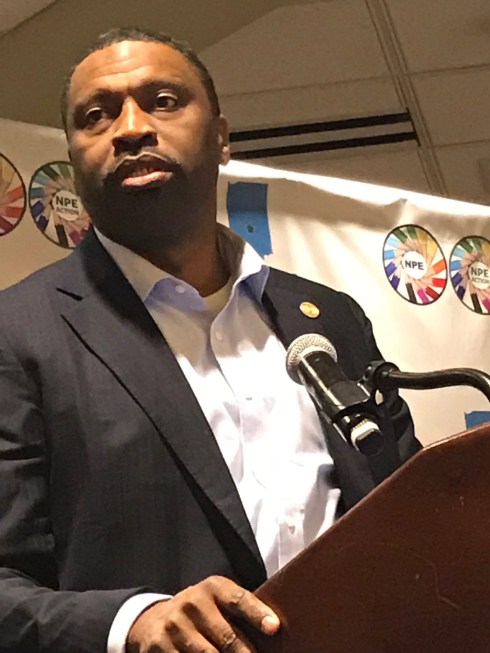
Derrick Johnson, President of NAACP, Speaking at #NPE18Indy – Photo by Anthony Cody
Derrick said the NAACP was not opposed to charter schools, but is calling for a moratorium until there is transparency in their operations and uniformity in terms of requirements. He said NAACP conducted an in depth national study of charter schools and found a wide range of problems that needed to be fixed before the experiment is continued.
Johnson has been quoted saying “For the NAACP, we have been far more aggressive toward bad public schools then we’ve ever been against charter schools.” He said “We believe the same [accountability] for public schools should apply to charter schools.”
When Jesse Hagopian asked Mr. Johnson about how best to promote Black Lives Matter at School. He responded positively to Hagopian but did add a note of caution saying it was extremely important that the movement be inclusionary.
A Personal Perspective
Almost four years ago, I attended my first NPE conference in Chicago. I was very motivated by what I saw and heard, however, I did have a concern. It seemed like the movement was dominated by older white teachers like me, who were approaching retirement age. I thought that did not bode well for the future of our movement to save quality public education.
This year the conference was even more motivational with a big positive difference. A large wave of diverse youthful professionals have taken leadership. The future looks very bright with so many brilliant young people who are growing their expertise in research and organizing. These youthful leaders are determined to save our public schools. They are standing up for a social good that is not related to Mammonism or self promotion. They are the resistance that is winning.
For me personally, I had the opportunity to cultivate deeper friendships with the many wonderfully individuals who I first met at NPE Chicago. That included once again speaking with my personal heroine and friend, Diane Ravitch. Diane and I were even able to take our fourth annual picture.

Diane Ravitch and Tom Ultican at #NPE18Indy – photo from Diane’s phone
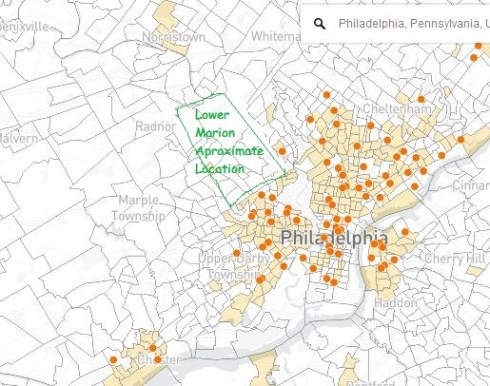
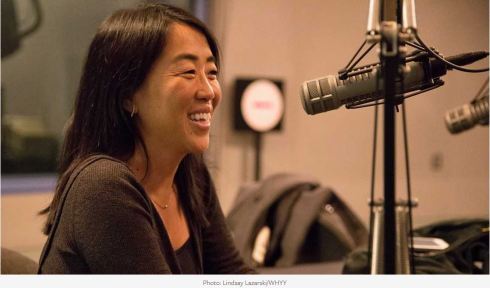
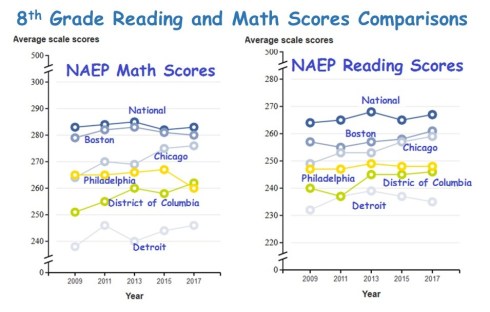

Recent Comments